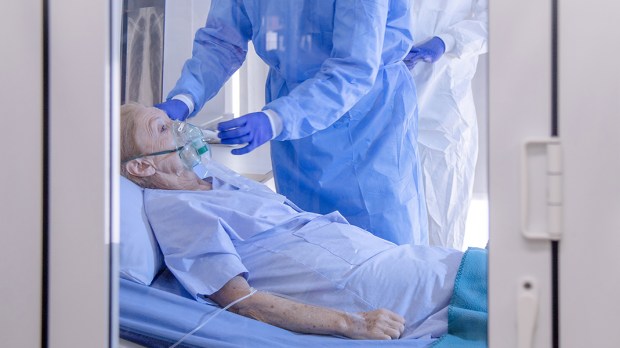In July, a woman went to MedStar’s Southern Maryland Hospital Center (MSMHC), part of the MedStar Health System, to give birth. Because of restrictions related to the COVID-19 pandemic, she had to give birth without any family members present. Soon after, her baby was taken to another room and kept from her, because the COVID-19 test she had taken upon entering the facility had come back positive.
The mother asked hospital administrators to have a Catholic priest visit her newborn and baptize him. According to a complaint she filed with a federal agency, the hospital denied her request due to a visitor exclusion policy adopted in response to the pandemic.
A month later, the Roman Catholic Diocese of Arlington, Virginia, filed a complaint with the same agency, a branch of the federal Department of Health and Human Services, alleging that Mary Washington Healthcare in Virginia would not permit a priest to provide the sacraments of Communion and Anointing of the Sick to a COVID-positive patient who was in an end-of-life situation and whose family requested that the priest visit the patient to provide the sacraments.
This week, the agency, the Conscience and Religious Freedom Division of HHS’s Office for Civil Rights, announced that both cases had been amicably resolved. In the first case, OCR, in partnership with the Centers for Medicare & Medicaid Services (CMS), provided technical assistance to MSMHC and MedStar Health System based on CMS guidance explaining adequate and lawful access to chaplains in hospital visitations during the COVID-19 pandemic.
The MedStar Health System updated its visitation policy for all 10 hospitals under its purview so that patients in COVID-19 positive units or sections, as well as non-COVID units, will be able to receive services from ministers, as long as the visit does not disrupt care.
In the case in Virginia, after learning of the complaint and in light of the urgency of the patient’s situation, Mary Washington Healthcare allowed the priest access to the patient to provide the sacraments. Shortly after, the family of a surgery patient in Mary Washington’s ICU also asked for a priest to visit to provide the sacraments. Although the patient was neither COVID-positive nor suspected of being COVID-positive, Mary Washington would not allow the visit. The hospital had designated the entire ICU as a COVID unit, and as such, it restricted visitors from entering, except in end-of-life situations. Although the patient had just undergone a serious procedure, Mary Washington had not determined the patient to be in an end-of-life situation and, thus, would not allow the patient access to clergy. The Diocese of Arlington again filed a complaint with OCR so that the ICU patient could receive religious support.
OCR also provided technical assistance to Mary Washington based on the CMS Guidance.
In consultation with the hospital’s infection control specialists, OCR reached a resolution with the parties that balances patient needs for compassionate spiritual support and the hospital’s need to protect staff, patients, and visitors from infection.
Under the new policy, patients in COVID units will have access to clergy in compassionate care situations, including end-of-life situations. Mary Washington will allow visits by clergy in COVID units, provided that the minister first completes scheduled infection control training offered by the hospital, uses personal protective equipment provided by the hospital, and signs an acknowledgement of the risks.
In extraordinary circumstances where one or more of these steps are not practicable, such as urgent end-of-life situations, clergy will be allowed to see a patient but must self-quarantine for 14 days after the visit.
The updated visitation policy states that patients in non-COVID units may exercise their religion by receiving clergy visitation at any reasonable time, as long as those services can be provided without disruption to care.
Archbishop Thomas G. Wenski of Miami, chairman of the U.S. Conference of Catholic Bishops’ (USCCB) Committee on Religious Liberty, applauded the announcement by the OCR.
“Jesus Christ, physician of our souls and bodies, gave us the sacraments to convey God’s grace and healing,” Archbishop Wenski said in a statement. “As Pope Francis has noted, the sacraments are ‘Jesus Christ’s presence in us.’ Without them, we are distanced from God, the source of our being and meaning. So it is of paramount importance that our government, public health authorities, and health care providers strive to respect the liberty of the faithful to receive the sacraments.
“COVID-19 requires us to limit or modify our physical interactions to some degree, in order to reduce risks to physical health,” Wenski continued. “Medical experts play a natural role in this effort but must avoid treating physical interactions in religious exercise as unnecessary or unacceptable risks because they are religious. A true understanding of human wellbeing accounts, as Jesus did, for the health of both body and soul.”
Roger Severino, Director of OCR said, “We applaud the MedStar Health System and Mary Washington Healthcare for ensuring that all of their patients can now receive religious support when they need it most.” Severino concluded, “Compassionate care requires treating the body without sacrificing the soul, and these resolutions show how hospitals can do that safely even during a pandemic.”

